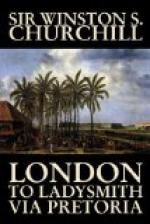All this time I was expecting to be brought before General Joubert, from whom I had some hopes I should obtain assurances that my character as a press correspondent would be respected. But suddenly a mounted man rode up and ordered the prisoners to march away towards Colenso. The escort, twenty horsemen, closed round us. I addressed their leader, and demanded either that I should be taken before the General, or that my credentials should be given back. But the so-called Field Cornet was not to be seen. The only response was, ‘Voorwaerts,’ and as it seemed useless, undignified, and even dangerous to discuss the matter further with these people, I turned and marched off with the rest.
We tramped for six hours across sloppy fields and along tracks deep and slippery with mud, while the rain fell in a steady downpour and soaked everyone to the skin. The Boer escort told us several times not to hurry and to go our own pace, and once they allowed us to halt for a few moments. But we had had neither food nor water, and it was with a feeling of utter weariness that I saw the tin roofs of Colenso rise in the distance. We were put into a corrugated iron shed near the station, the floors of which were four inches deep with torn railway forms and account books. Here we flung ourselves down exhausted, and what with the shame, the disappointment, the excitement of the morning, the misery of the present, and physical weakness, it seemed that love of life was gone, and I thought almost with envy of a soldier I had seen during the fight lying quite still on the embankment, secure in the calm philosophy of death from ‘the slings and arrows of outrageous fortune.’
After the Boers had lit two fires they opened one of the doors of the shed and told us we might come forth and dry ourselves. A newly slaughtered ox lay on the ground, and strips of his flesh were given to us. These we toasted on sticks over the fire and ate greedily, though since the animal had been alive five minutes before one felt a kind of cannibal. Other Boers not of our escort who were occupying Colenso came to look at us. With two of these who were brothers, English by race, Afrikanders by birth, Boers by choice, I had some conversation. The war, they said, was going well. Of course, it was a great matter to face the power and might of the British Empire, still they were resolved. They would drive the English out of South Africa for ever, or else fight to the last man. I said:




